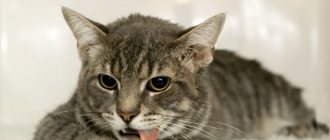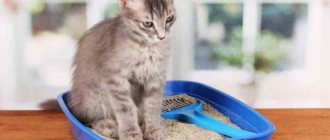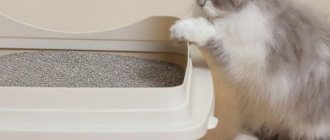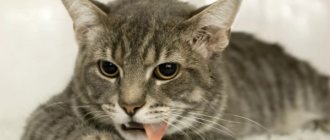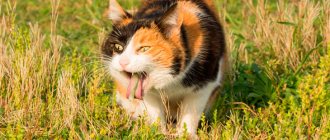Veronica Igorevna Sharipova
veterinarian Petstory
Quite often, owners are faced with the fact that their cat vomits after eating, so we have prepared material about why this happens and what to do. Vomiting is one of the most common symptoms with which cats are brought to the clinic. There can be many reasons for vomiting after eating - from poisoning to helminthic infestations. We will tell you about the types of vomiting, why a cat vomits food after eating and how you can help him in our article.
- Vomiting of undigested food
- What can you do at home?
A cat vomits after eating: the main thing
- vomiting in a cat after eating is a health-threatening condition, therefore, at the first attacks, the cat must be immediately shown to a veterinarian;
- the causes of vomiting after eating can be: gastritis, poisoning, foreign body entering the stomach or intestines, helminthic infestation and other reasons;
- diagnosis must be comprehensive in order to exclude all possible concomitant diseases;
- treatment depends on the cause: in the presence of a foreign body, surgery may be required, in case of gastritis and poisoning - conservative treatment, in case of helminthic infestation - the administration of anthelmintic drugs.
Symptoms that require immediate veterinary attention
If other symptoms are combined with a cat’s vomiting of undigested food, the animal will need emergency veterinary care:
- nausea occurs after every meal;
- a small kitten that has not been vaccinated is vomiting;
- the cat constantly vomits, even if he does not eat;
- the animal’s body temperature has increased or, conversely, decreased;
- vomit has a foul odor or looks like feces;
- there are worms in the vomit or an admixture of blood or mucus;
- the condition is accompanied by seizures.
What can cause vomiting
From a physiological point of view, vomiting is caused by irritation of receptors located in the esophagus and stomach. In cats, there are dangerous and non-dangerous causes of vomiting.
Dangerous reasons
Dangerous causes include diseases that lead to the rapid death of an animal. These include:
- poisoning with toxic substances (household chemicals, poisonous plants, some medications);
- blockage of the gastrointestinal tract by foreign substances;
- exacerbation of internal diseases such as ulcerative gastritis, chronic renal failure, liver lipidosis, etc.
- neoplasms in the stomach and intestines;
- viral diseases such as panleukopenia, feline infectious peritonitis, leukemia.
Associated symptoms for dangerous causes of vomiting include complete refusal to eat, loose stools, or constipation. The pet may become lethargic, sad, and its coat may become dull.
Non-dangerous causes of vomiting
The concept of “non-dangerous reasons” is, of course, conditional. Typically, these include chronic diseases of the pet that do not require emergency treatment at the clinic.
- Gastritis and sensitive digestion - most often these diseases develop as a result of improper feeding of the pet;
- Vomiting caused by wool getting into the stomach; however, it must be taken into account that even a hairball can lead to complete obstruction of the gastrointestinal tract and the need for surgical intervention;
- Vomiting due to stress or motion sickness, for example, when traveling in a car;
- Vomiting as a result of helminthic infestation;
- Vomiting during pregnancy of a pet, etc.
There are usually no associated symptoms in this case. But the cat may, for example, become more lethargic, eat less and refuse to play.
Causes of vomiting in cats
Vomiting or reverse peristalsis, regurgitation is a normal process for a cat. If emptying the stomach through the mouth does not occur too often, does not cause deterioration in well-being, and is not accompanied by additional pathological signs, there is no need to worry.
However, repeated vomiting is a symptom of infectious, invasive and non-contagious diseases.
Types of vomiting
Vomiting of undigested food
If a cat vomits after eating undigested food, most likely the problem is an acute inflammatory disease of the stomach or the presence of a foreign body in it. If a cat vomits after every meal, then an immediate visit to a veterinary clinic is necessary, since the pet’s food is not digested and dehydration, hypoglycemia and other pathologies can quickly occur.
Vomiting white foam
Vomiting white foam is often caused by problems with the animal's nutrition. If you vomit in the morning, before breakfast, this is the so-called hungry vomiting, which is associated with a long interval between dinner and breakfast. If the vomiting is not associated with the period of the day, then perhaps the pet should change its diet.
Vomiting yellow foam (bile)
Vomiting of bile is almost always associated with diseases of the liver and/or gall bladder and requires contacting a veterinary clinic for diagnosis and treatment.
Vomiting blood
Vomiting with blood may indicate damage to the gastrointestinal tract as a result of gastritis, enteritis, etc., vomiting of whole blood is a life-threatening condition and may indicate a perforation of the stomach, an extensive ulcer, or acute poisoning with anticoagulants (rat poison).
How to help your pet
Veterinarians do not recommend treating a cat on your own in such a situation, but while waiting for an appointment with a doctor, it is important to understand what to do to make your pet feel better:
- provide the cat with constant access to clean and fresh water;
- give rice water, you can add boiled cereal to the food;
- include meat puree for baby food in the diet;
- feed the animal skinless chicken breast;
- Give your cat low-fat or low-fat cottage cheese.
It is recommended to follow this gentle regimen for at least 1 day. If vomiting does not recur, you can return to your normal diet. If your cat continues to burp, you will still need to visit a doctor.
Treatment
What to do if your cat vomits after eating depends on the type and cause of the vomiting.
If a cat feels sick and vomits after eating undigested food as a result of blockage of the gastrointestinal tract by a foreign object, treatment is carried out endoscopically or surgically.
White foam vomiting is most often treated by changing the diet (increasing the frequency of feeding, for cats it is recommended to feed ad libitum or portioned meals at least 6 times a day) or changing the line (for example, to food for sensitive digestion, to food with a different type of protein, if the pet is given economy class food – transfer to premium class food).
For liver diseases, which are characterized by bile vomiting, a special diet is required (hepatic food line or a strict home diet prepared by a nutritionist), as well as symptomatic treatment depending on the cause of the disease.
Vomiting with blood requires a special diet for diseases of the gastrointestinal tract (gastro intestinal line or homemade food prepared by a nutritionist), symptomatic treatment, and may also require a blood transfusion for severe anemia due to blood loss.
What can you do at home?
If your cat vomits food, the first thing you need to do is determine whether he still has an appetite. If, after vomiting, he refuses food and water, becomes sad and lethargic, you cannot self-medicate, because time may be wasted, and the pet may die from peritonitis, liver lipidosis and sepsis. If your pet’s appetite and activity are preserved, you can try changing the diet to a therapeutic diet from the Gastro Intestinal line and giving a hair removal paste (“malt paste”) according to the instructions in a therapeutic dose. If the cat has not been treated for parasites for a long time, it is necessary to carry out a comprehensive treatment.
What to do if your cat vomits after eating
If your cat is vomiting after eating undigested food, it is best not to self-medicate. Any medications given orally, firstly, will come out with vomiting and will not help, and secondly, they can increase vomiting and worsen the condition. Injection use of antiemetic drugs at home is also undesirable: some of them can have a detrimental effect, since they increase perilstaltic movements of the intestine and can lead to its rupture in the presence of a foreign body. Other antiemetic drugs that act only on the vomiting center can blur the picture of the disease, and so, you may miss the time to begin diagnosis and treatment.
What actions should be taken if the cat often vomits?
- If a cat is poisoned, it is necessary to give it activated carbon to adsorb harmful and toxic substances, and put in a dropper with glucose and ascorbic acid. Thanks to them, intoxication in the body is removed.
- For the first few days, the cat should limit its food intake. To avoid the threat of dehydration, a solution of “Regidron” is given (read the rule in the instructions). Instead of Regidron, you can give water with about nine grams of table salt dissolved in it. This is approximately about half a teaspoon per half liter of water. In cases of refusal of water, the animal is given an injection of Ringer's solution (only on the recommendation of a doctor).
- To prevent and protect the mucous membrane from irritation, it is necessary to take bismuth preparations.
- In case of severe damage to the gastric mucosa, antibiotics are prescribed.
© shutterstock
During treatment of an animal associated with digestive problems or poisoning, the cat should be on a diet for several days.
It is important to feed the animal:
- in small portions;
- food prepared for the cat should be soft;
- the meat should be white and introduced gradually.
Cats, like humans, may have increased intracranial pressure and may also experience motion sickness. A vomiting reaction may be associated with blood circulation and the respiratory system. Vomiting in animals (cats) is a unique symptom that allows one to judge the presence of serious diseases.
Useful materials:
- Cutaneous horn General description of the disease Cutaneous horn on the forehead or face (ICD 10 code - L57.0) -...
- Itching and odorless discharge Main causesBefore considering the factors that provoke the appearance of discharge that has a sour odor, it is necessary to immediately note...
- Normal temperature in animals Normal temperature in different types of animals Veterinary services Day hospital for animals Veterinary certificates Vaccination…
- A cat vomits after eating Common causes of vomiting in cats In veterinary practice, there are many causes of vomiting in cats, conditionally...
What to do if your kitten vomits food?
If a kitten vomits food, first of all, you need to rule out helminthic infestation. If the kitten has never been treated for parasites or has been treated for a long time, it is necessary to carry out treatment! Tablets based on milbemycin oxime or drops on the withers with emodepside and praziquantel are good for kittens against worms. If the kitten vomits several times, becomes sad, lethargic, and refuses to eat, you must immediately contact a veterinary clinic, otherwise the kitten may die!
Prevention
So, we have looked at why a cat may vomit food after eating, now we will look at how to prevent this.
The most important thing is to comply with the basic rules for keeping animals:
- Cats require regular treatment for worms, regardless of whether they are indoors or have access to the street - parasite eggs can be brought into the house from the street!
- It is very important to feed cats correctly; the so-called table food will sooner or later lead to illness in your pet! If you do not want to feed your cat industrial food, we recommend contacting nutritionists to create a balanced menu.
- To prevent hair vomiting and the formation of mats, do not forget to brush your cats regularly, especially during the shedding period.
- Preventive vaccination will protect your pets from many viral diseases that a cat can catch even while sitting at home.
- It is also important to exclude the possibility of poisoning from household chemicals and poisonous plants!
